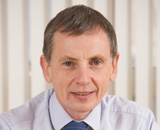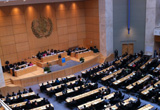 As I queued in the rain to get through security I pondered life in a non-governmental organisation (NGO) rather than a Ministry of Health. It rarely makes the headlines in the press but every year the World Health Organization (WHO) has its general assembly in Geneva. It brings together government delegations from member countries from across the world to debate key health issues and set the strategic direction for the organisation. It’s also a honey pot for NGOs and lobbyists of various forms. Previously I have attended as part of the UK delegation, but this year I am attending this, the 65th World Health Assembly, on behalf of the World Federation of Public Health Organisations. Country delegates are exempt security checks but people from NGOs, and the press, have to queue to go through scanners as in an airport. The segregation also means, among other indignities, that one can’t walk into the main meeting rooms by the main doors, but have to enter the room by an anonymous back door. No wonder NGOs are critical of WHO and the role they are allocated.
As I queued in the rain to get through security I pondered life in a non-governmental organisation (NGO) rather than a Ministry of Health. It rarely makes the headlines in the press but every year the World Health Organization (WHO) has its general assembly in Geneva. It brings together government delegations from member countries from across the world to debate key health issues and set the strategic direction for the organisation. It’s also a honey pot for NGOs and lobbyists of various forms. Previously I have attended as part of the UK delegation, but this year I am attending this, the 65th World Health Assembly, on behalf of the World Federation of Public Health Organisations. Country delegates are exempt security checks but people from NGOs, and the press, have to queue to go through scanners as in an airport. The segregation also means, among other indignities, that one can’t walk into the main meeting rooms by the main doors, but have to enter the room by an anonymous back door. No wonder NGOs are critical of WHO and the role they are allocated.
In recent years WHO has invited prominent guest speakers to address the assembly. Jimmy Carter and the Prince of Wales have been, and Bill Gates has even been twice (reflecting, no doubt, the huge philanthropic commitment he has to health issues), but my absolute favourite was Archbishop Desmond Tutu in 2008. Never was the saying “You could have heard a pin drop” more appropriate, as, in the grandeur of the Assembly Hall of the Palais des Nations, he held the audience enthralled with his eloquent plea for justice and compassion.
 This year there were two speakers. Princess Lalla Salma of Morocco was the first to speak, but not until she was introduced with a detailed biography that included the birth dates of her two children. She then delivered an address about the undoubted progress being made in cancer care in Morocco. I was interested to see if we had such charmingly detailed information provided about the second speaker. We didn’t learn any such domestic trivia about Jonas Gahr Støre, Norway’s Foreign Minister, who delivered a well-balanced address that noted the absolute poverty that existed within middle-income countries, and also pointed out that in Norway every step forward in women’s rights had resulted in economic benefit for the country. There’s a lesson there somewhere for WHO.
This year there were two speakers. Princess Lalla Salma of Morocco was the first to speak, but not until she was introduced with a detailed biography that included the birth dates of her two children. She then delivered an address about the undoubted progress being made in cancer care in Morocco. I was interested to see if we had such charmingly detailed information provided about the second speaker. We didn’t learn any such domestic trivia about Jonas Gahr Støre, Norway’s Foreign Minister, who delivered a well-balanced address that noted the absolute poverty that existed within middle-income countries, and also pointed out that in Norway every step forward in women’s rights had resulted in economic benefit for the country. There’s a lesson there somewhere for WHO.
Side events at assemblies are often the most interesting and an evening meeting under the title “Building global solidarity to counter the tobacco industry’s attacks” proved the point. We heard the background on smoking with a new twist, in an estimate that smoking could lead potentially to one billion premature deaths in the 21st Century. Gloucestershire born Jane Halton, secretary of the department of health and ageing in Australia, won the admiration of the audience with her account of battling the tobacco industry over plain packaging. More terrifying was her revelation that answering one particular Freedom of Information request on behalf of the tobacco industry cost a staggering 643,000 Australian dollars!
Gabriel Scally is a public health physician and holds visiting chairs at the University of the West of England and the University of Bristol.